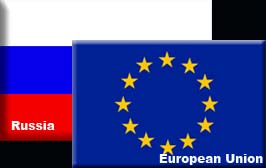The EU-Russia summit: the main points
 Nice, France - When European Union and Russian leaders meet in the French resort of Nice on Friday, the following points are expected to draw their attention:
Nice, France - When European Union and Russian leaders meet in the French resort of Nice on Friday, the following points are expected to draw their attention:
FINANCIAL CRISIS: The EU-Russia summit comes less than 24 hours before the leaders of the world's most powerful nations meet in Washington to discuss a response to the global financial crisis.
French President Nicolas Sarkozy, the host of Friday's meeting,
and his guest, Russian President Dmitry Medvedev, are both set to fly to Washington for the talks directly upon leaving Nice.
Both men are expected to highlight the need for global financial reforms to boost transparency and governance.
EUROPEAN SECURITY: Diplomatic sources say that Medvedev is keen to present details of a "new security architecture" for Europe.
In earlier speeches he has called for a legally-binding system to limit arms and outlaw the use of force in Europe "from Vancouver to Vladivostok" (on Russia's Pacific coast).
EU officials say that Sarkozy - holder of the bloc's rotating presidency - is not mandated to formally accept any proposals, but that he has already expressed interest in the idea.
STRATEGIC TREATY: On Monday, EU foreign ministers decided to relaunch talks on a strategic treaty with Russia, which they froze following its August invasion of Georgia.
Sarkozy and Medvedev are widely expected to agree to a date for the next round of talks in areas as diverse as trade, energy and culture.
GEORGIA: Despite the decision to relaunch talks on the new treaty, EU foreign ministers on Monday insisted that the bloc is not back to "business as usual" with Russia.
EU sources say that Sarkozy is set to highlight EU concerns over both the Georgia issue and Russia's more general references to its exclusive "sphere of influence" in Europe.
However, diplomats also say that neither Sarkozy nor Medvedev has an interest in provoking a clash - making it likely that the issue will not feature prominently in talks.
TRADE: The EU is concerned by Russia's policy of charging foreign airlines to fly over Siberia, its high tariffs on timber exports, its unpredictable investment climate and its rules on food safety, which critics say are regularly used to block foreign imports.
On Wednesday, Russia announced that it was postponing the introduction of even higher wood tariffs, in a move EU officials welcomed. However, concerns remain high over the Siberian overflight issue, which has been deadlocked since 2006.
The EU is also set to press for the launch of a system to provide early warning of any impending energy shortages.
Russia is expected to call for better access to European energy networks for its own companies. (dpa)